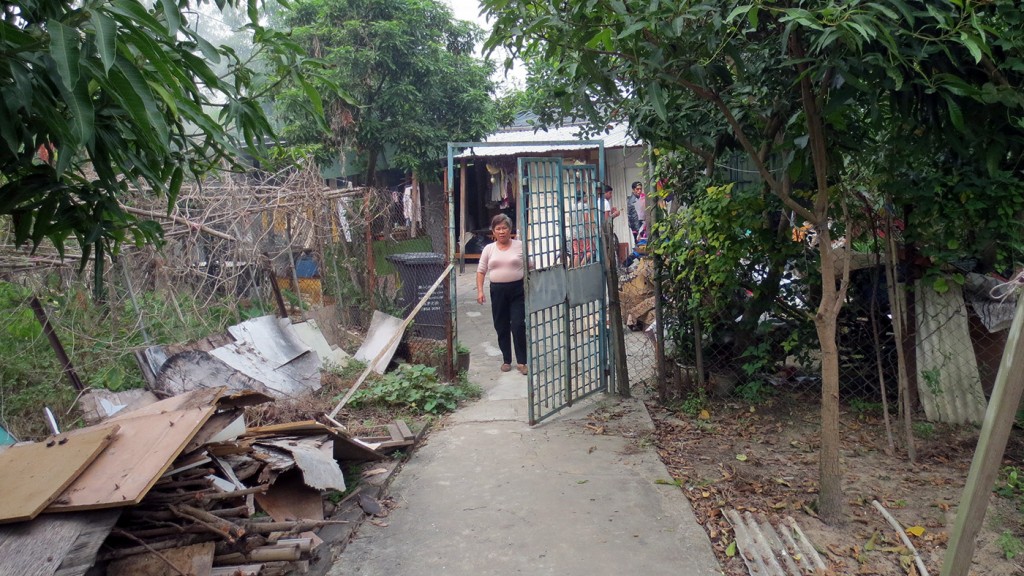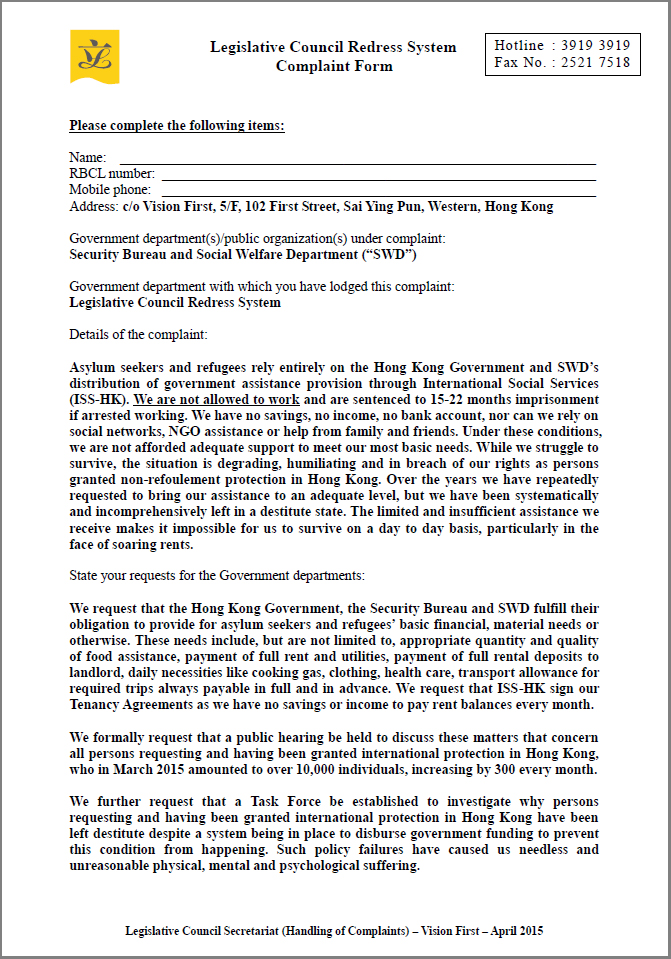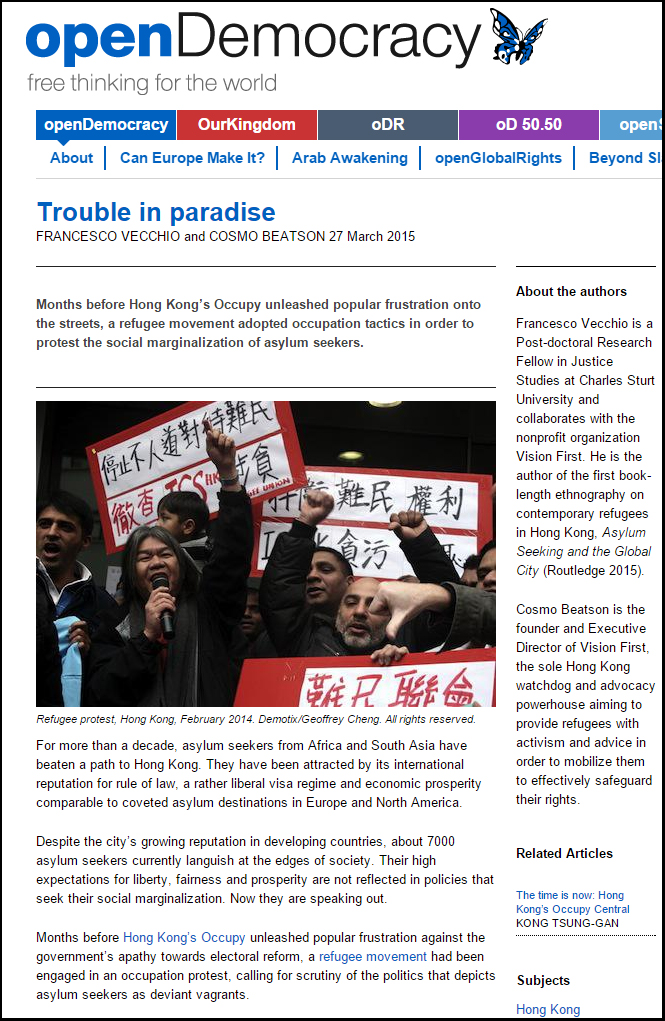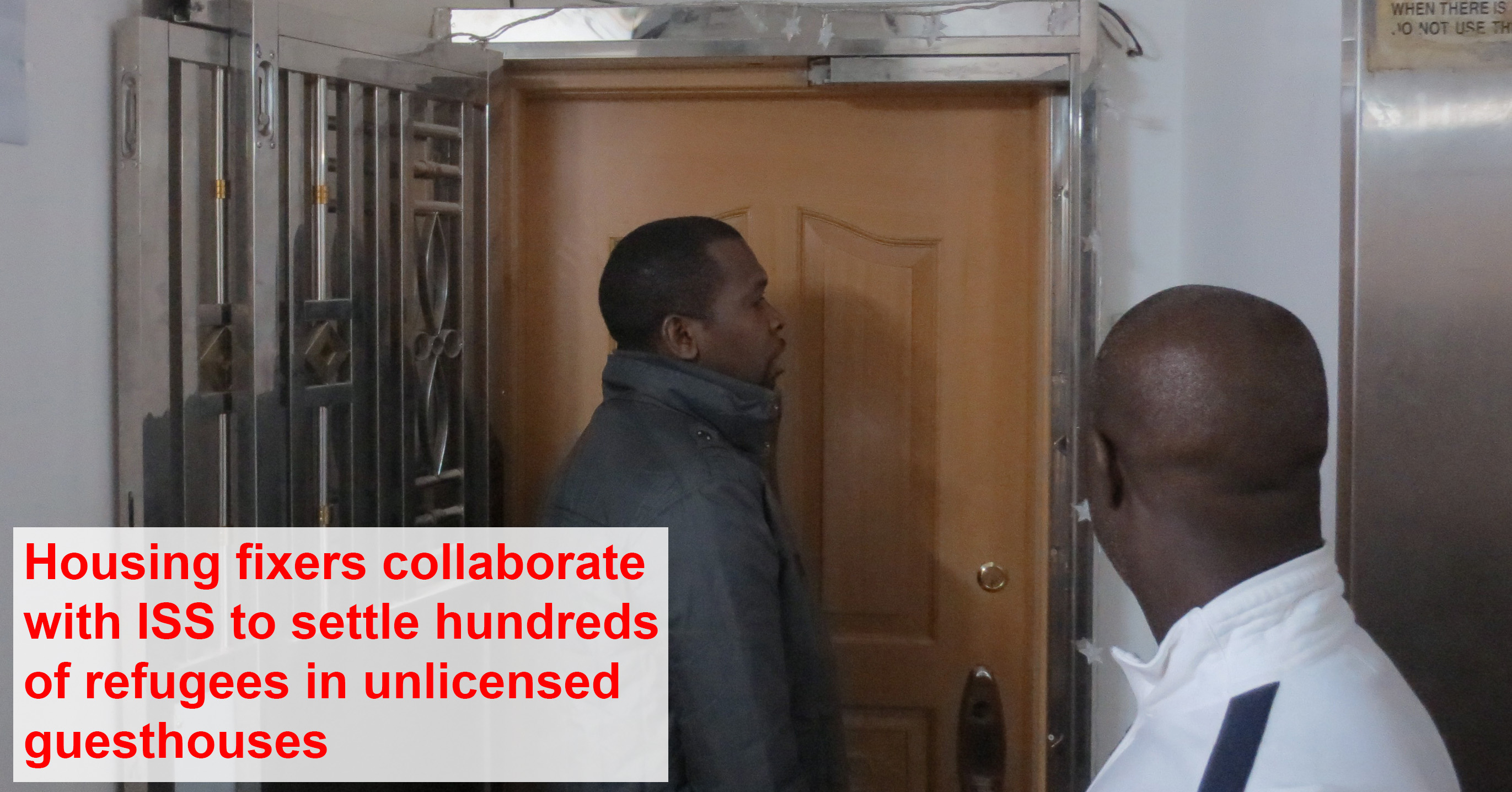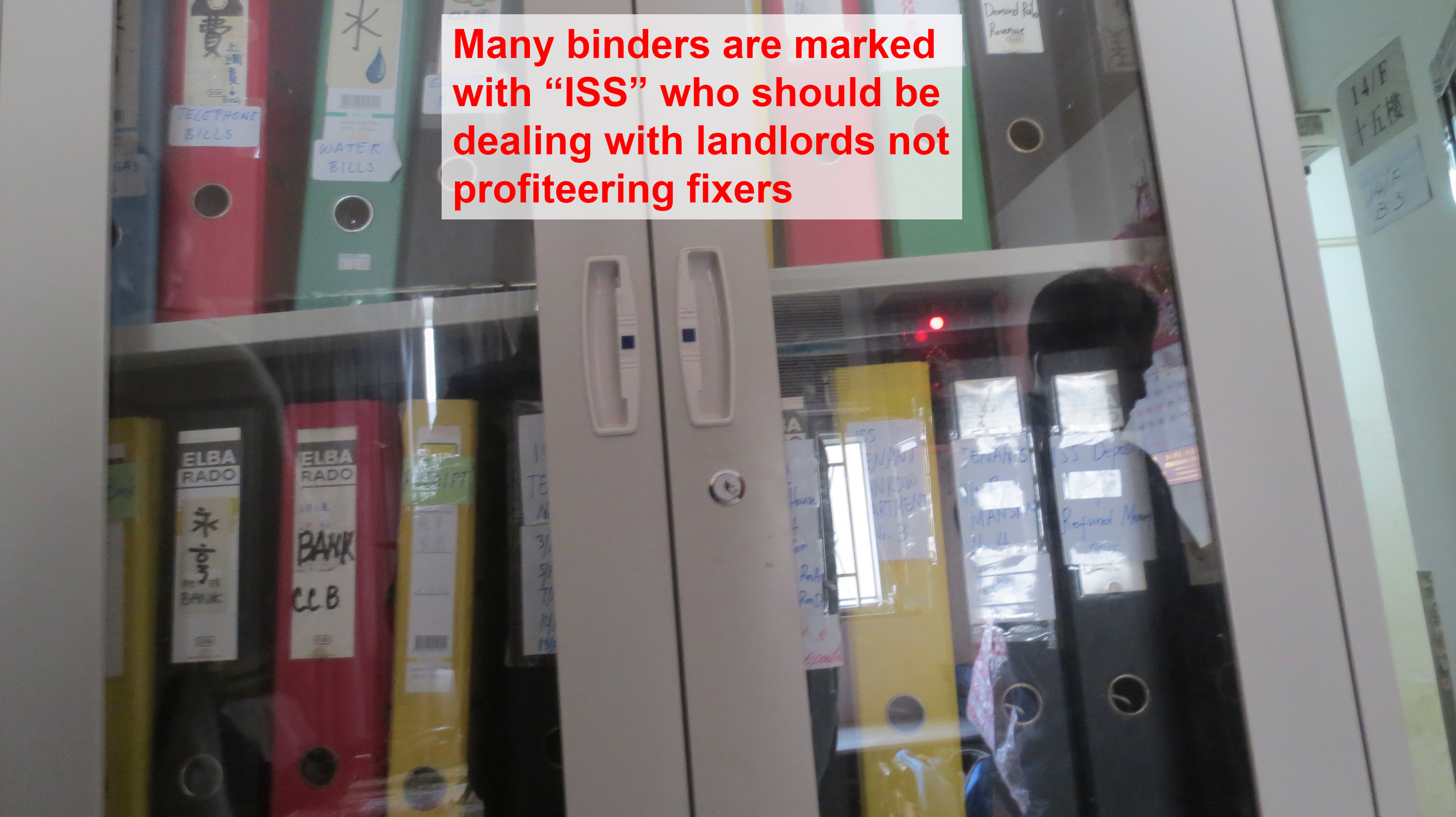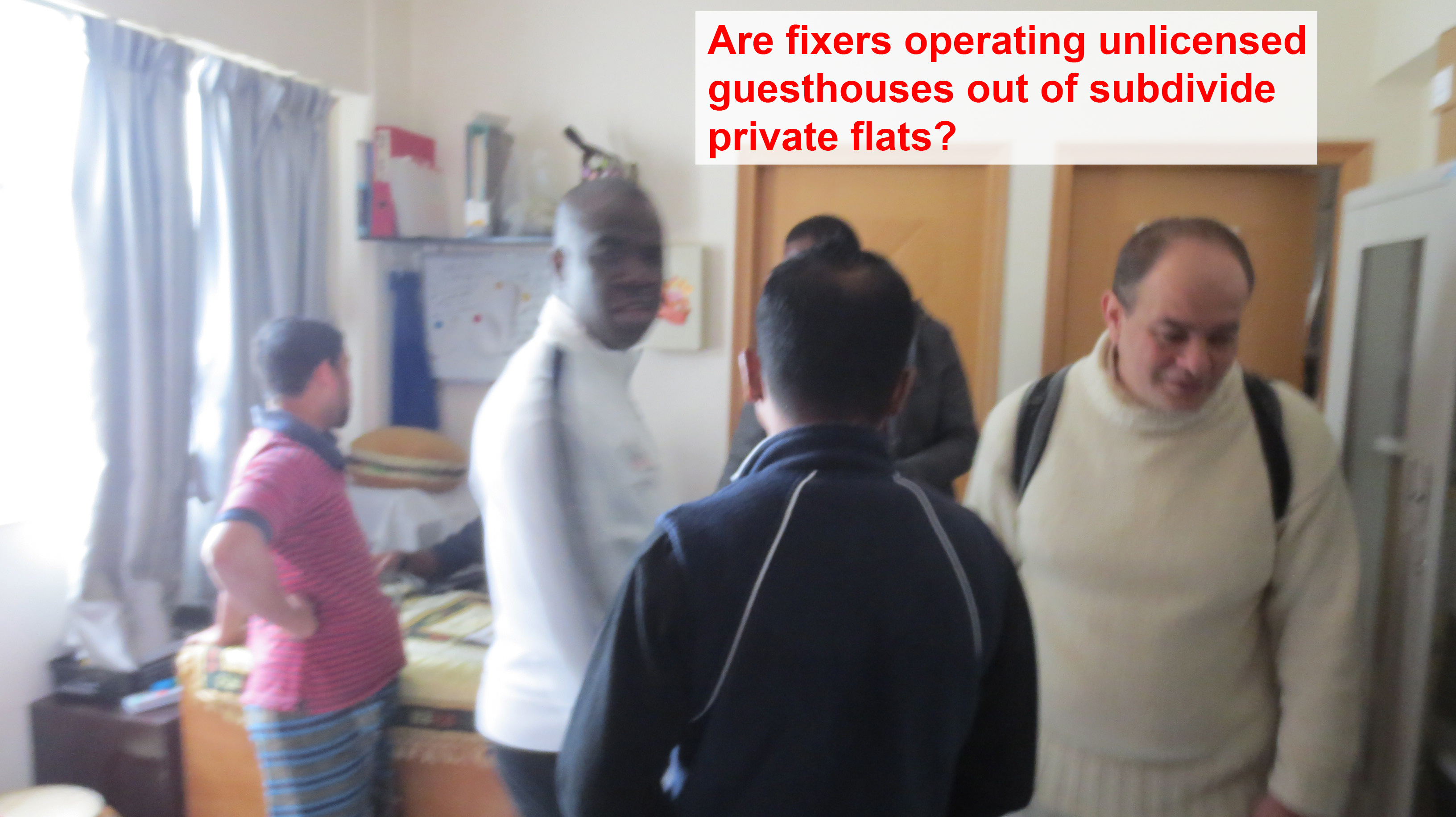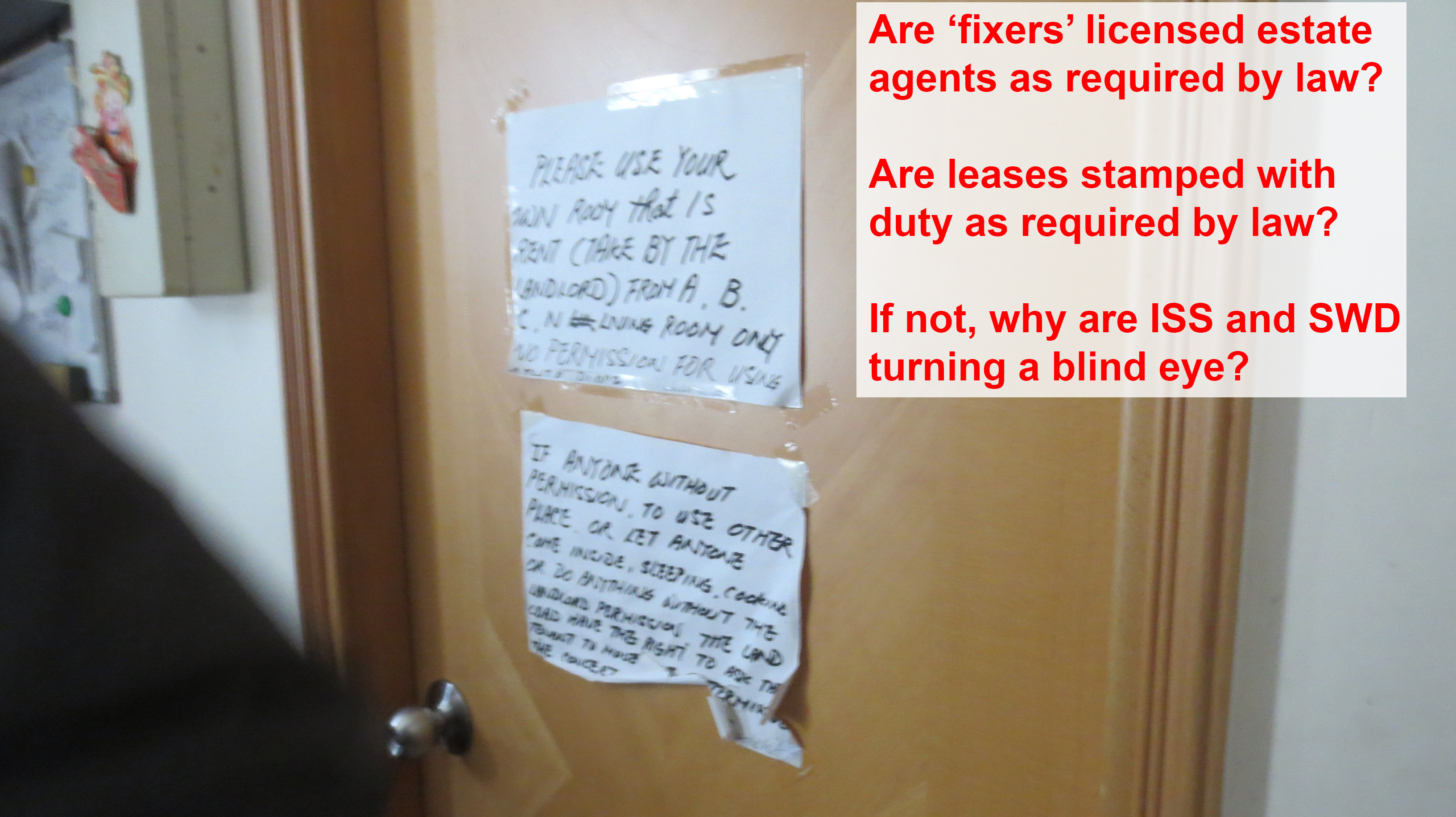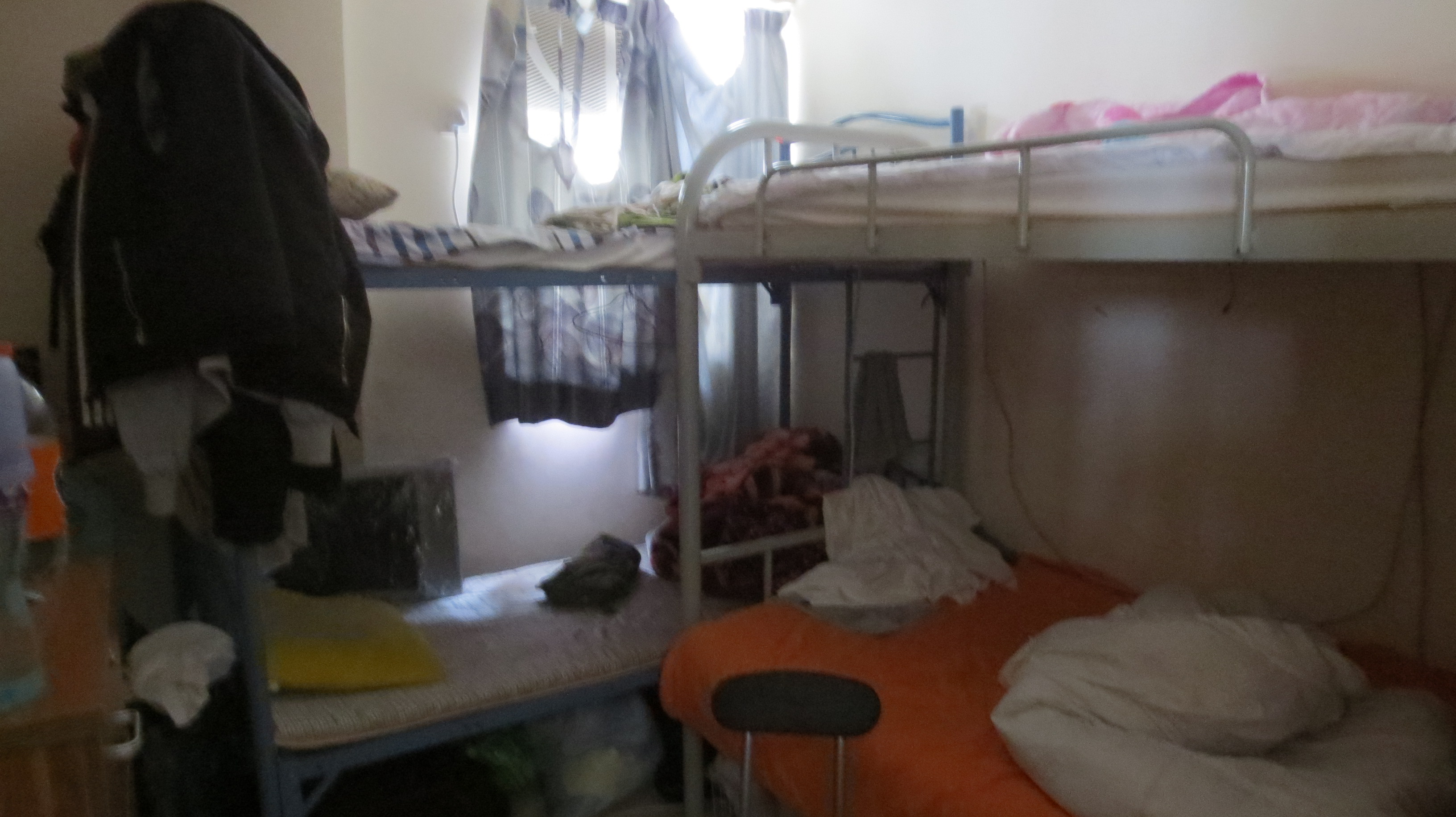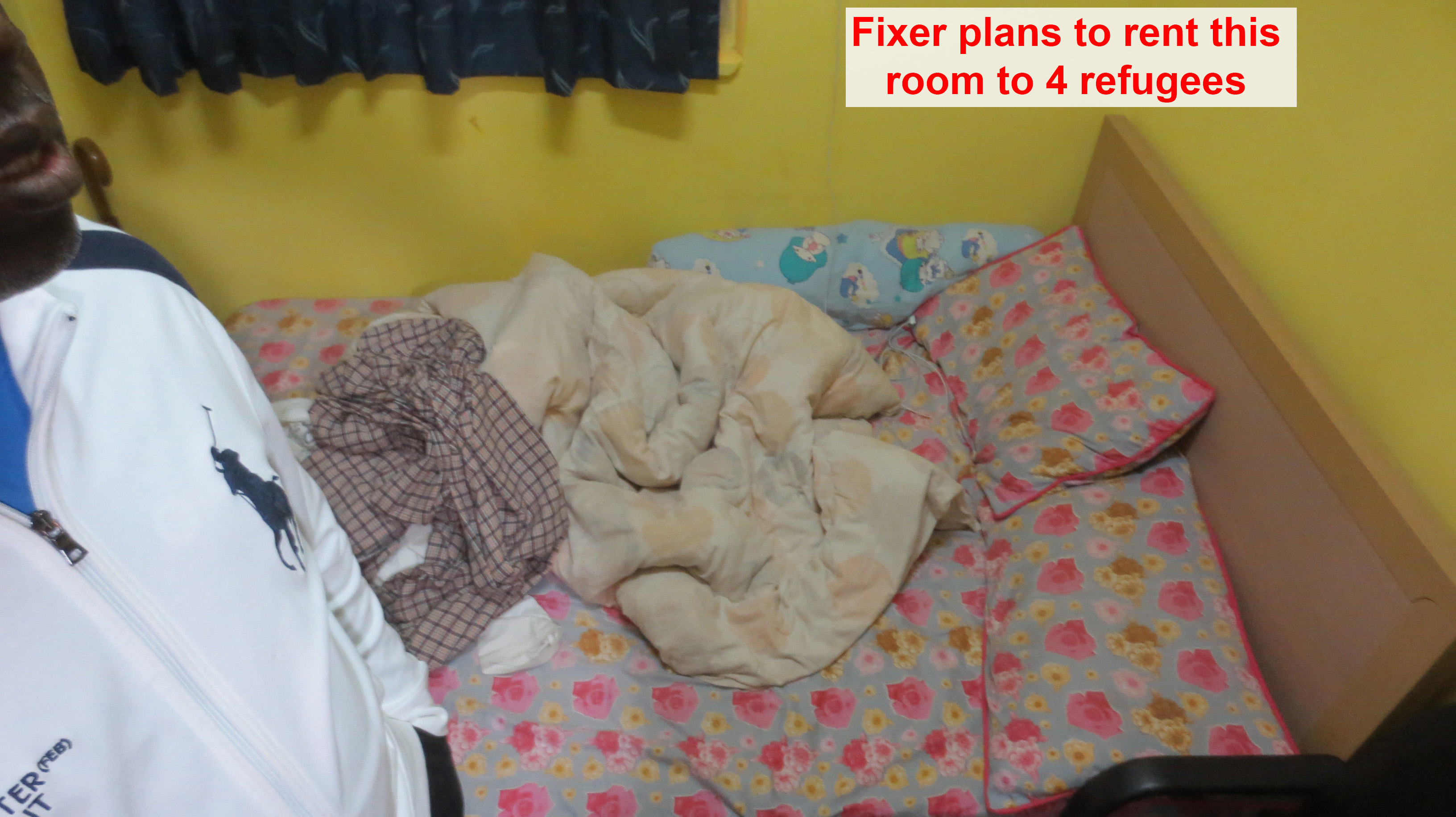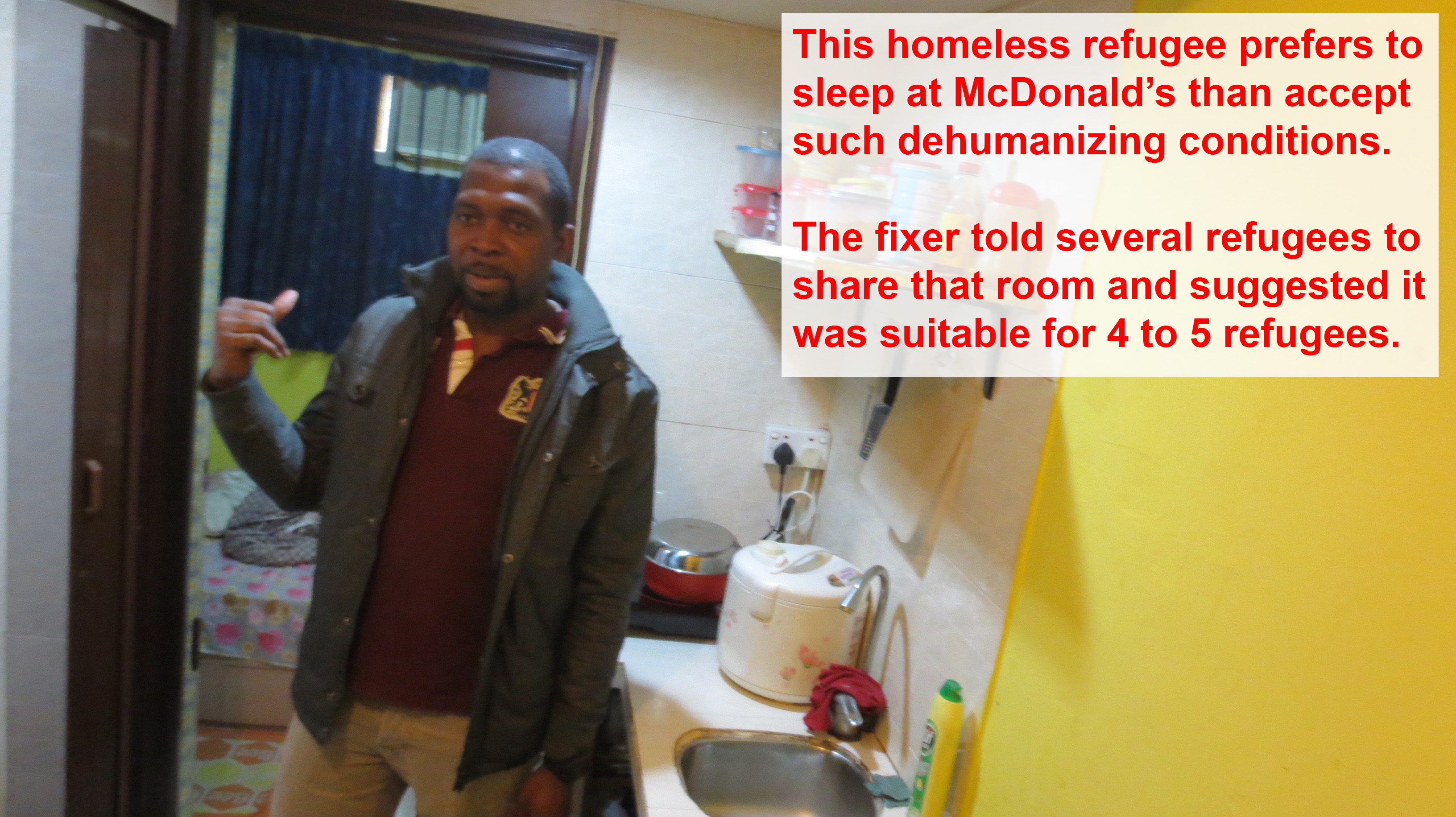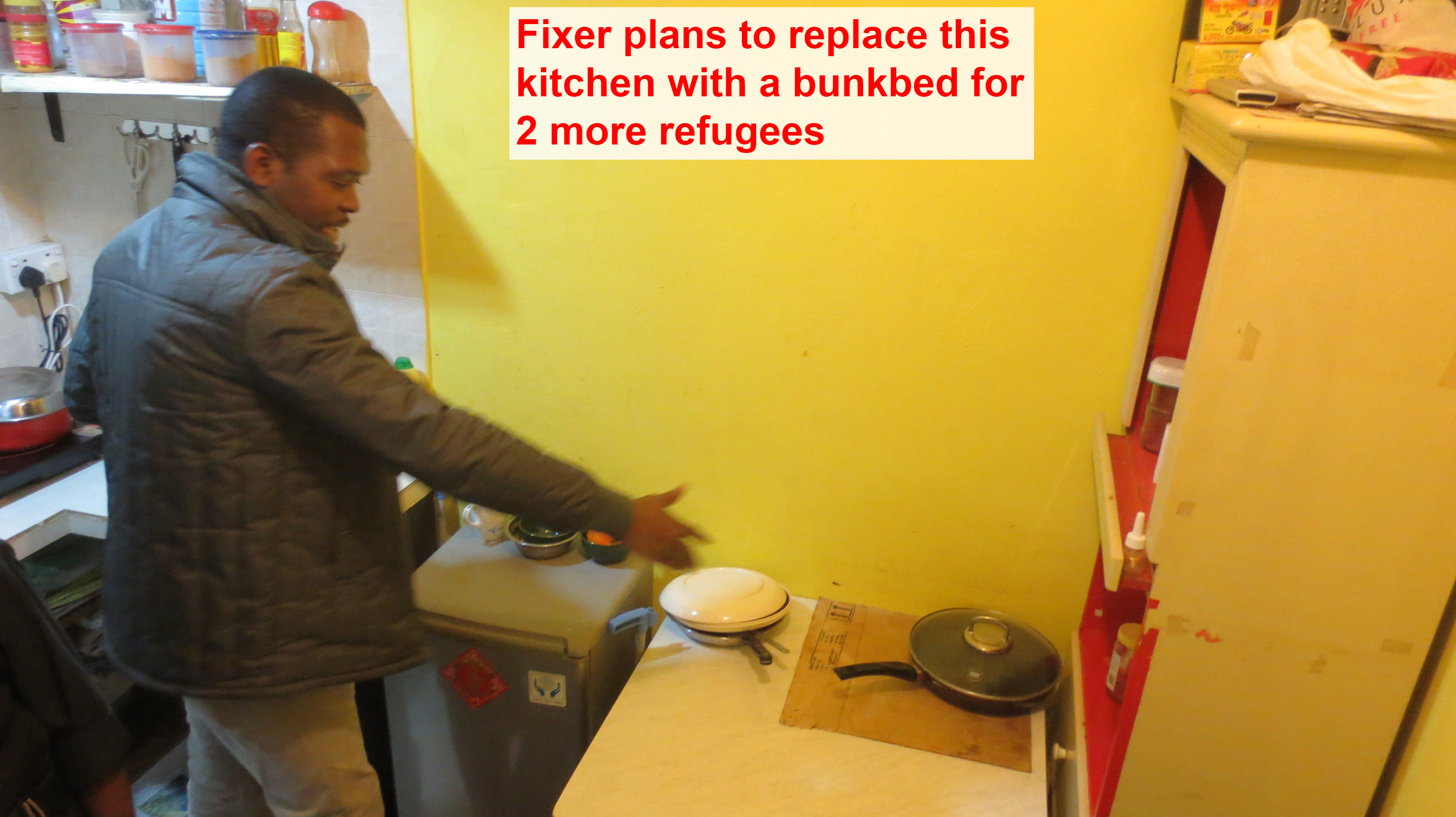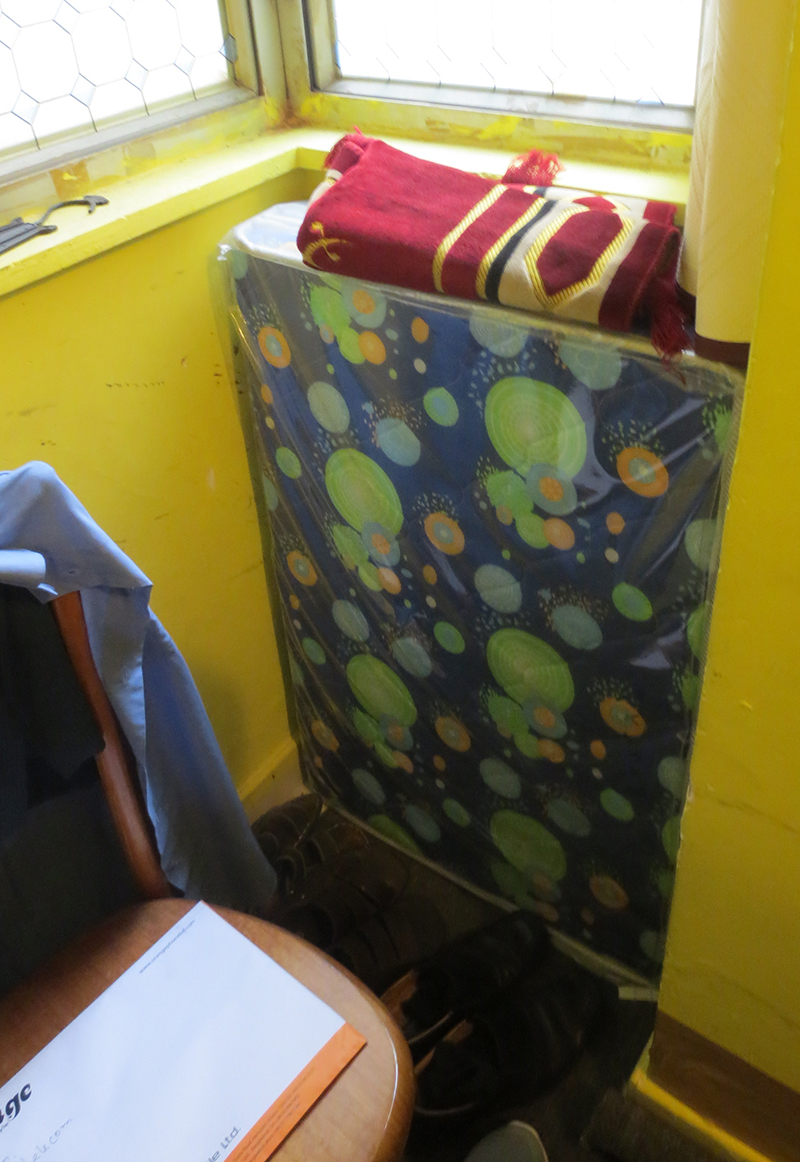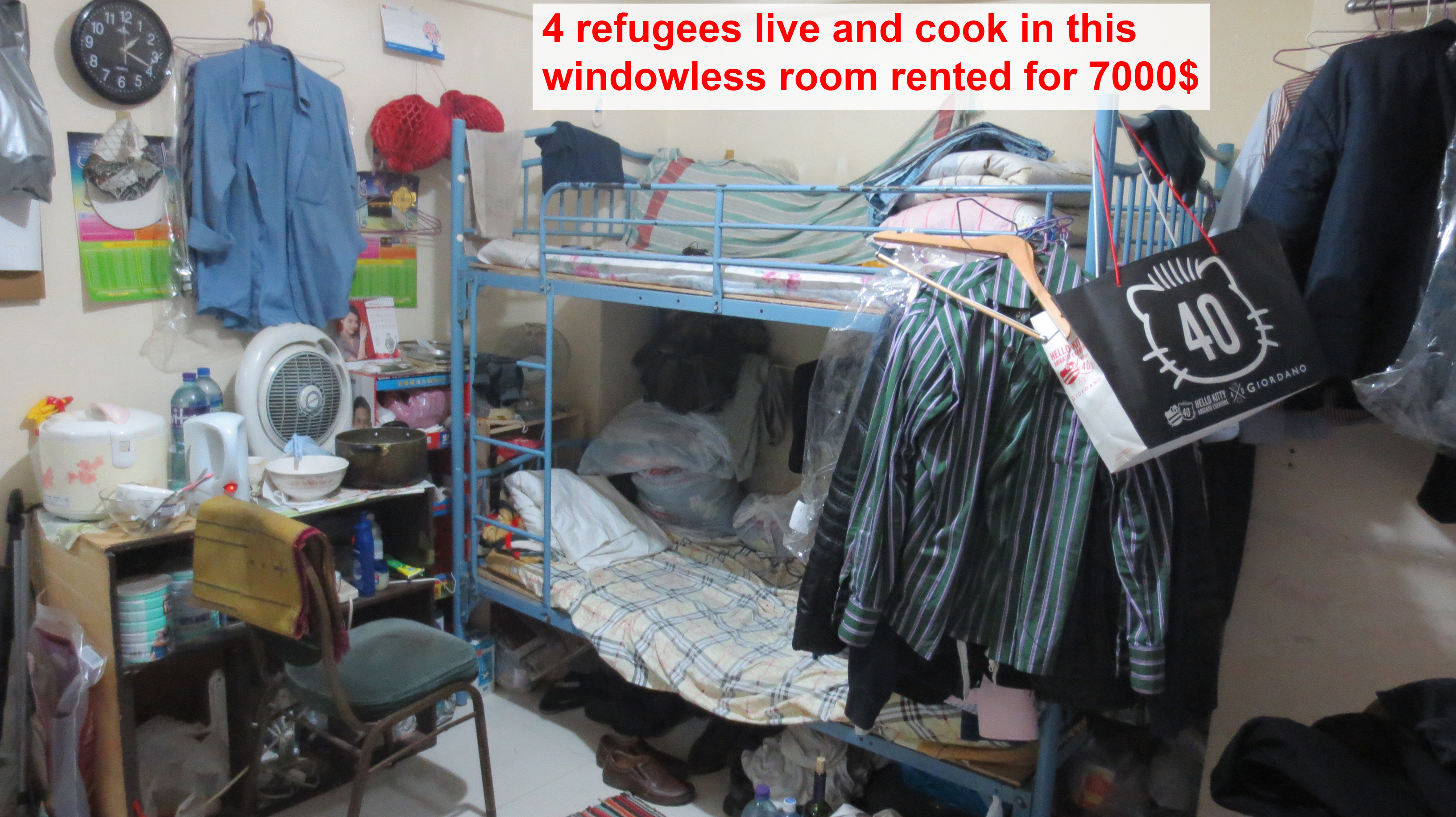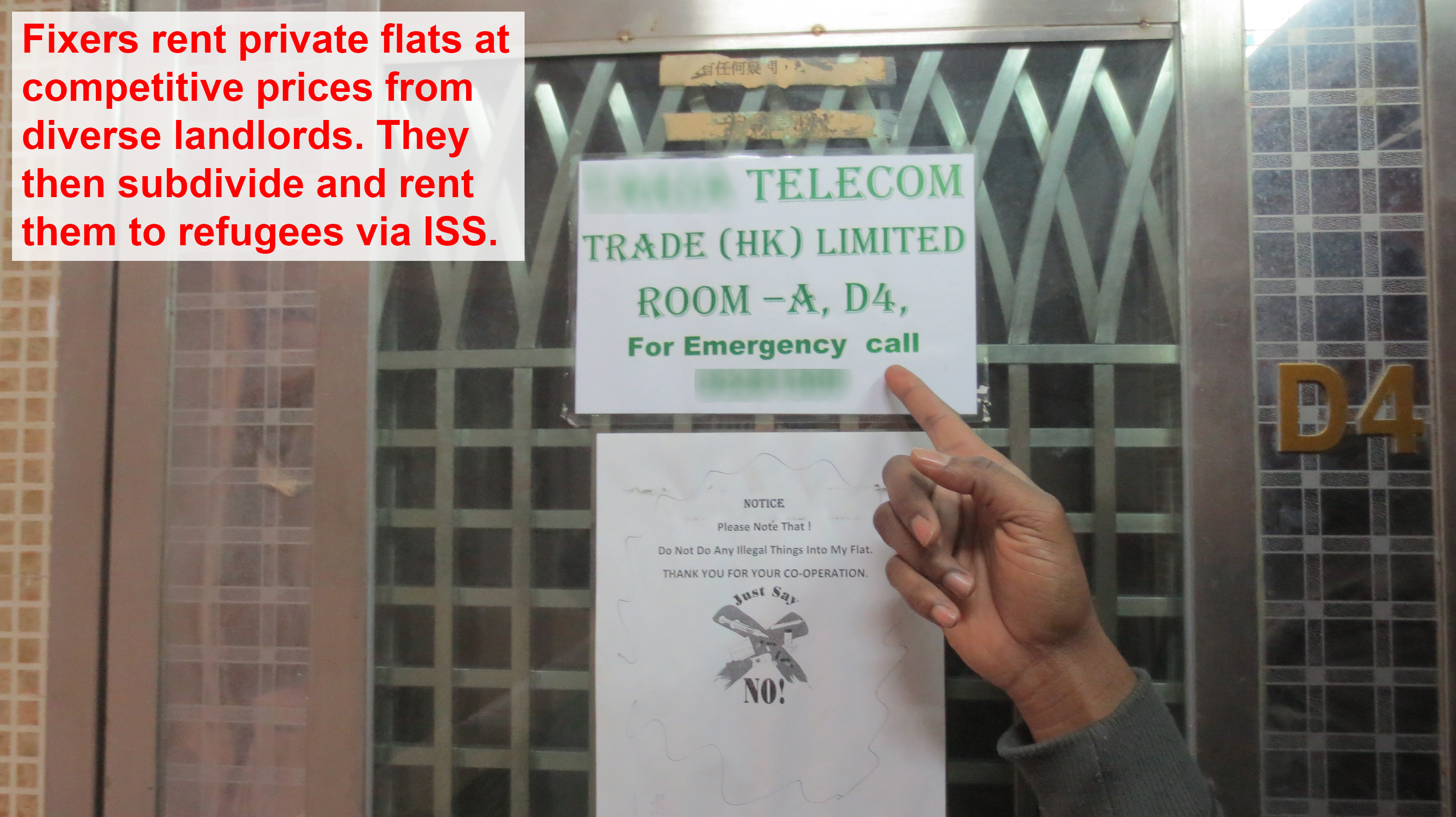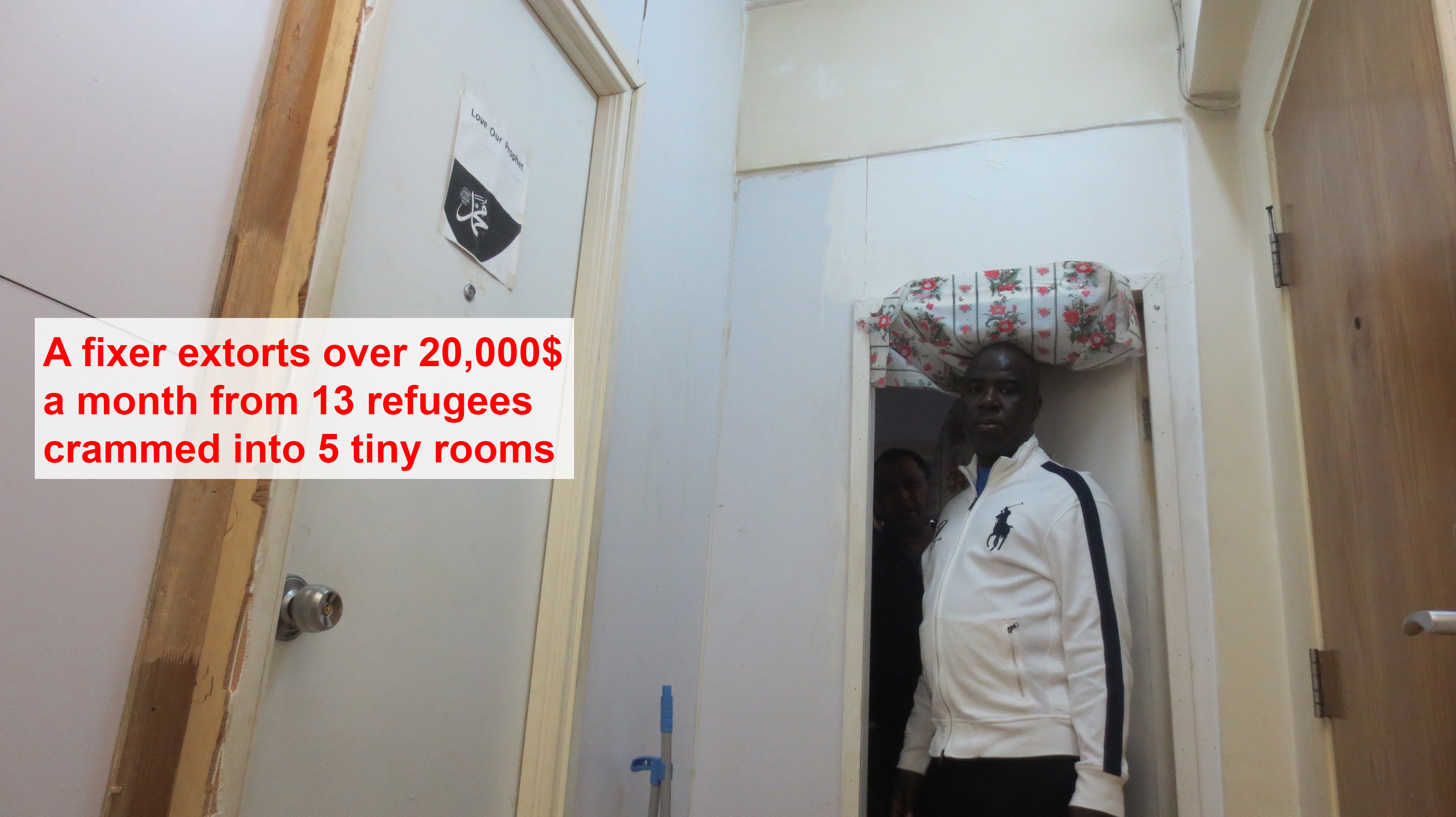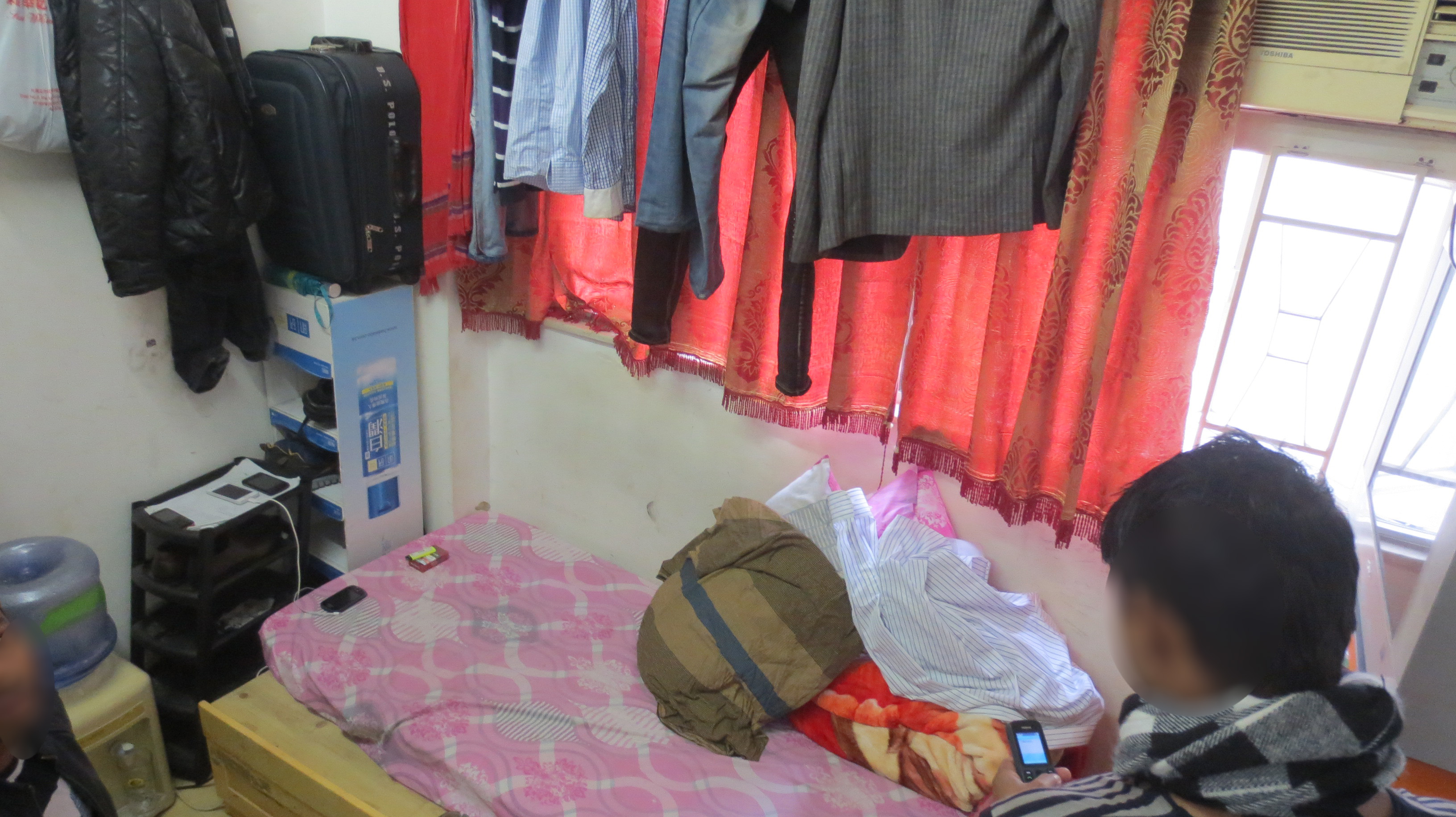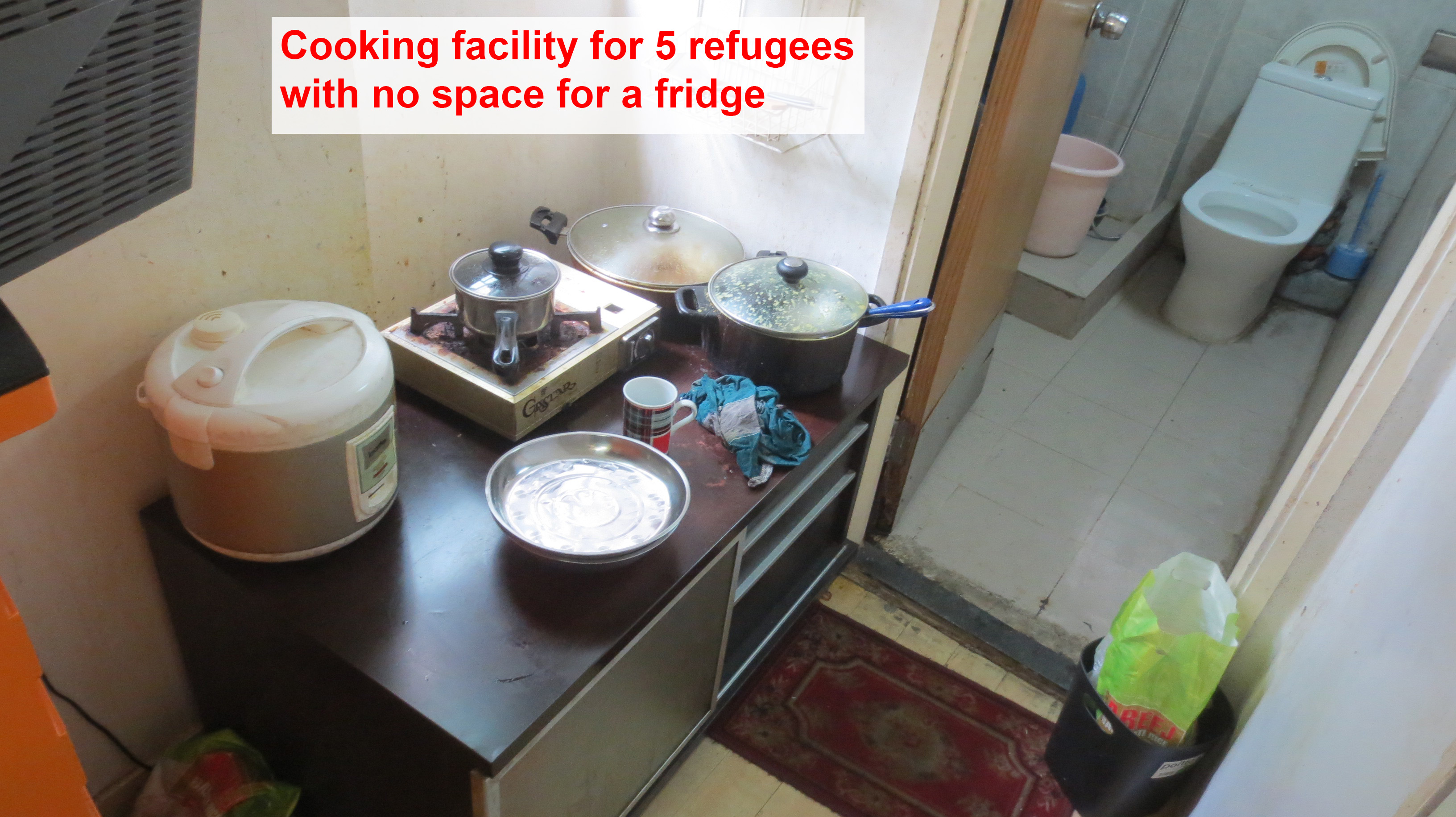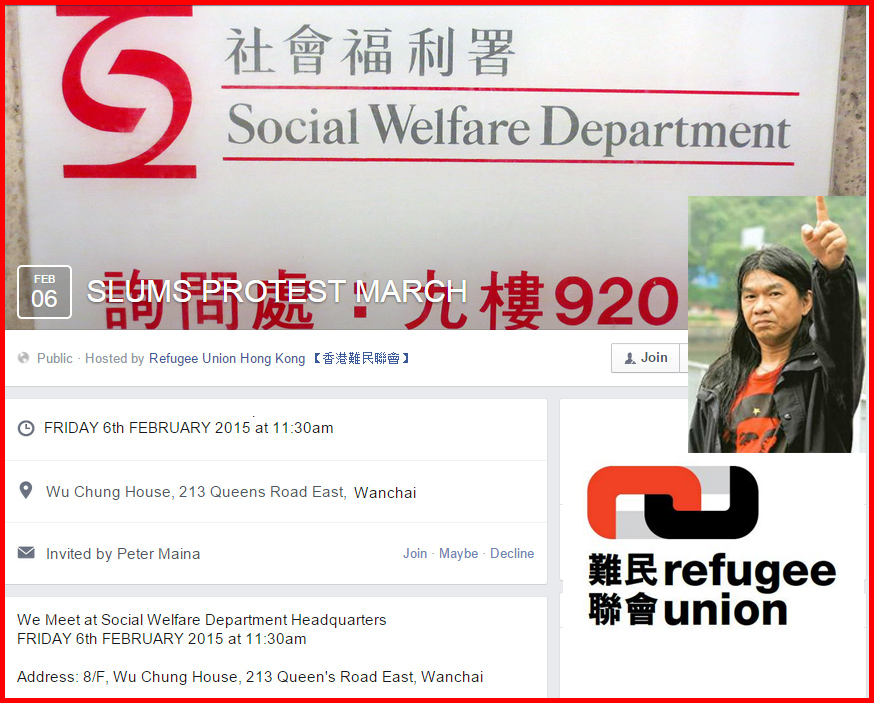Archive
HKU Magazine – 遠走他方的故事
Apr 15th, 2015 | Advocacy, Immigration, Media, Refugee Community | Comment
遠走他方的故事
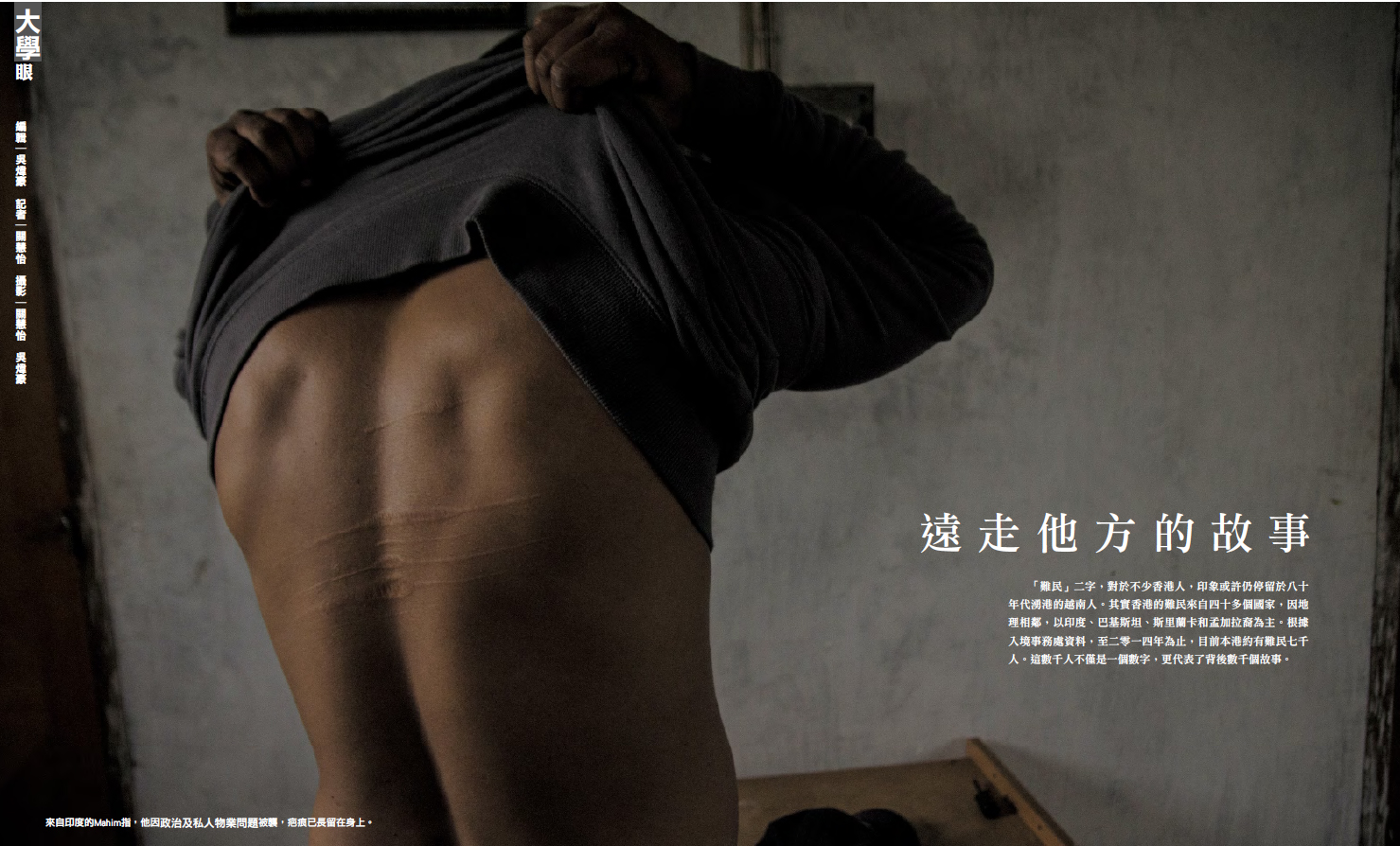
Complaint to the Legislative Council Redress System
Apr 1st, 2015 | Advocacy, Food, Housing, Legal, VF updates, programs, events, Welfare | Comment
Asylum seekers and refugees rely entirely on the Hong Kong Government and Social Welfare Department (“SWD”) distribution of government assistance provision through International Social Services (ISS-HK). They are not allowed to work and are sentenced to 15-22 months imprisonment if arrested working. They have no savings, no income, no bank account, nor can they rely on social networks, NGO assistance or help from family and friends. Under these conditions, they are not afforded adequate support to meet their most basic needs. While they struggle to survive, the situation is degrading, humiliating and in breach of their rights as persons granted non-refoulement protection in Hong Kong. Over the years they have repeatedly requested to bring their assistance to an adequate level, but they have been systematically and incomprehensively left in a destitute state. The limited and insufficient assistance they receive makes it impossible for them to survive on a day to day basis, particularly in the face of soaring rents.
Vision First request that the Hong Kong Government, the Security Bureau and SWD fulfill their obligation to provide for asylum seekers and refugees’ basic financial, material needs or otherwise. These needs include, but are not limited to, appropriate quantity and quality of food assistance, payment of full rent and utilities, payment of full rental deposits to landlord, daily necessities like cooking gas, clothing, health care, transport allowance for required trips always payable in full and in advance. We request that ISS-HK sign the Tenancy Agreements as refugees have no savings or income to pay rent balances every month.
We formally request that a public hearing be held to discuss these matters that concern all persons requesting and having been granted international protection in Hong Kong, who in March 2015 amounted to over 10,000 individuals, increasing by 300 every month.
Vision First further request that a Task Force be established to investigate why persons requesting and having been granted international protection in Hong Kong have been left destitute despite a system being in place to disburse government funding to prevent this condition from happening. Such policy failures have caused refugees needless and unreasonable physical, mental and psychological suffering.
Vision First invites refugees to download and complete the form below that will be filed at the Complaints Office of the Legislative Council Secretariat over the coming weeks and months.
Vision First supports lawmaker Fernando Cheung Chiu-hung
Mar 5th, 2015 | Advocacy, Crime, Refugee Community, Welfare | Comment
We are deeply saddened by the arrest of a great political supporter, the Honorable Fernando Cheung.
Fernando stands apart for his commitment to refugees going back over a decade. Veteran refugees recall him visiting them in prisons and Immigration detention ten years ago, when the injustice they suffered didn’t yet register with the broader society and media as today.
Fernando has a special heart for all the vulnerable and disenfranchised people in Hong Kong, with no exception. He always displayed the very best of Hong Kong hospitality to refugees who suffer unjustly against government policies aimed at discouraging, rather than assisting, seeking asylum.
The charges seem political. Hong Kong Government is on a witch-hunt to punish the organizers of the Occupy movement that challenged their authority.
We fervently hope that justice will prevail.
Fernando did the right thing – he stood resolutely with the people unafraid of the consequences.
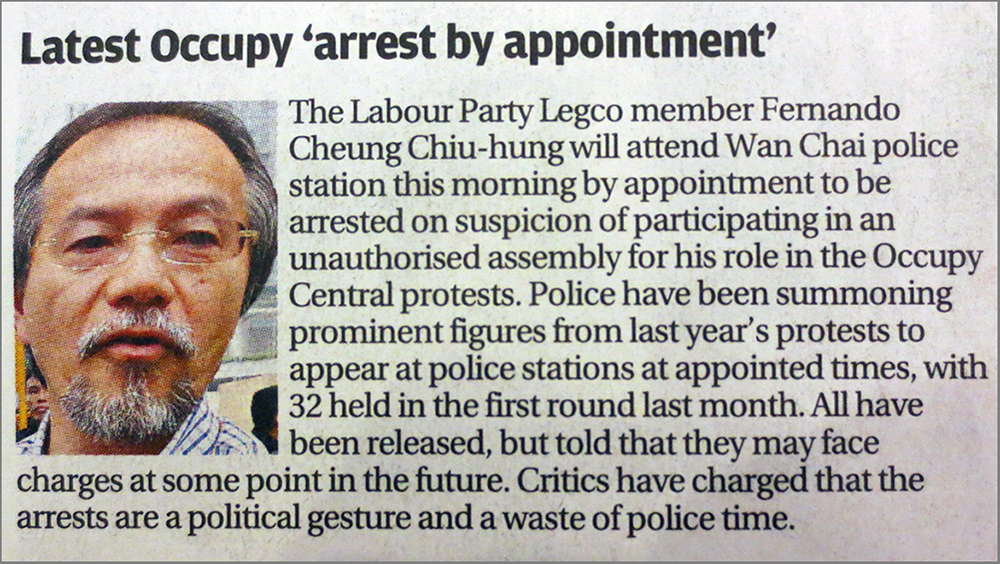
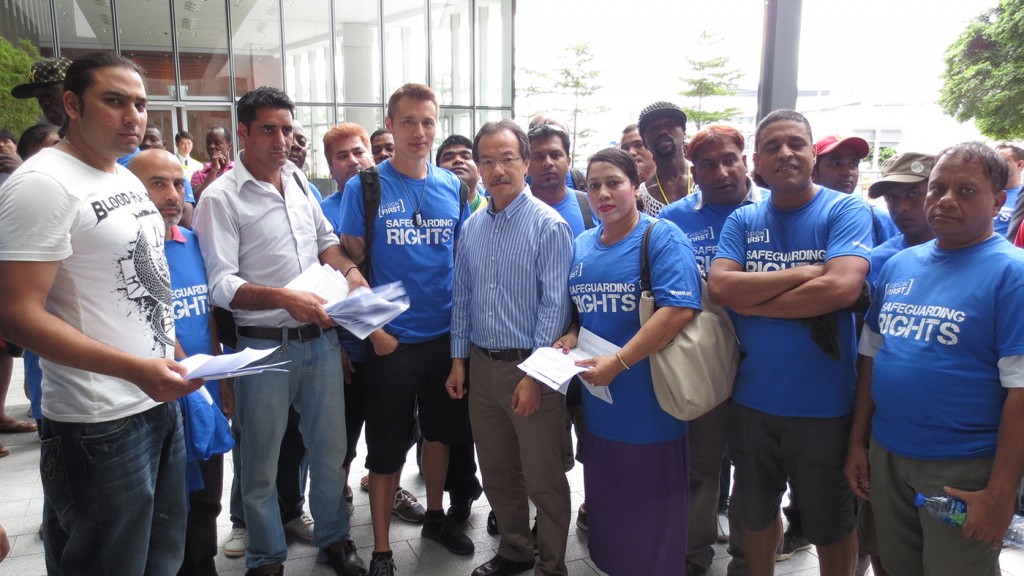
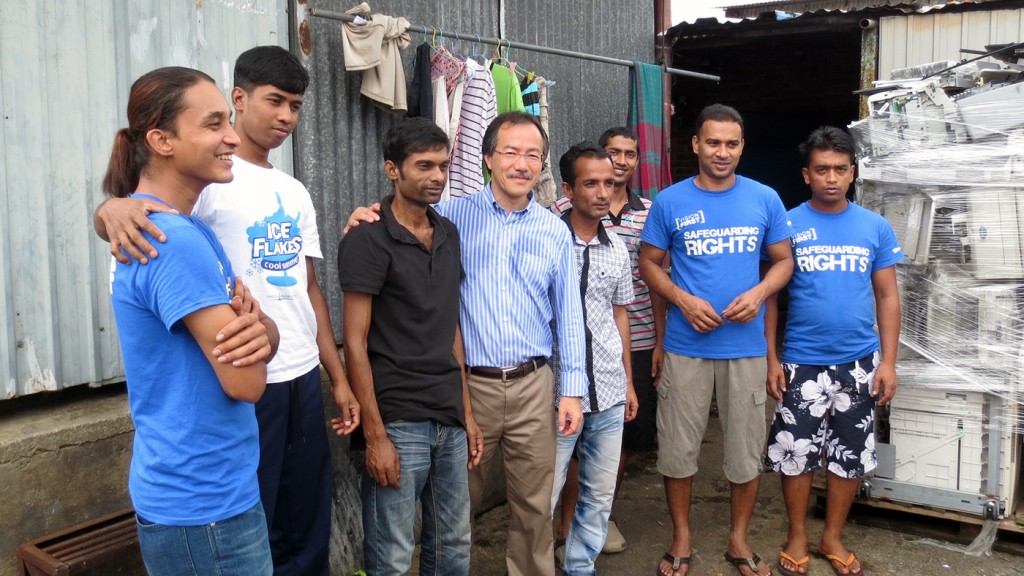
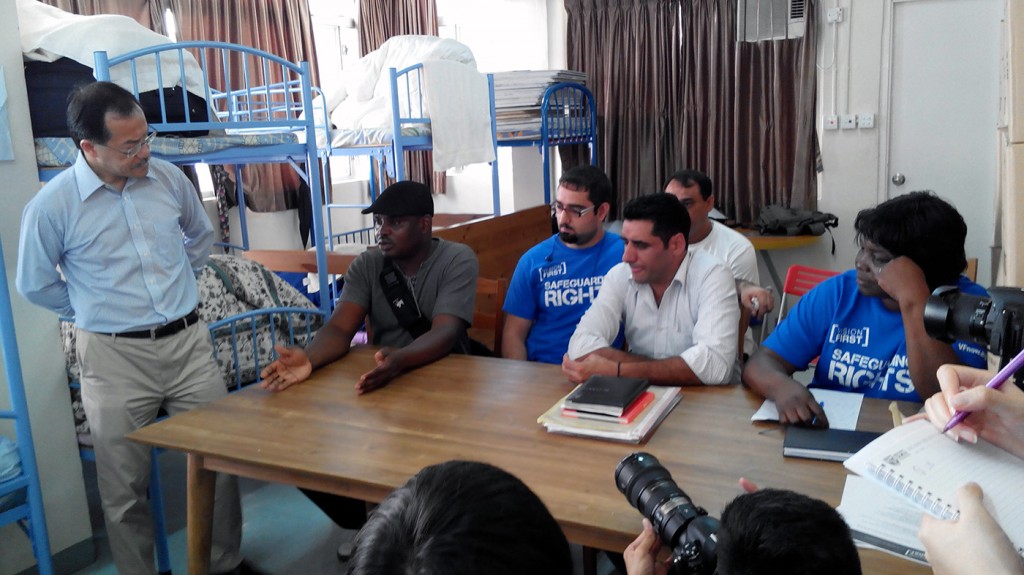
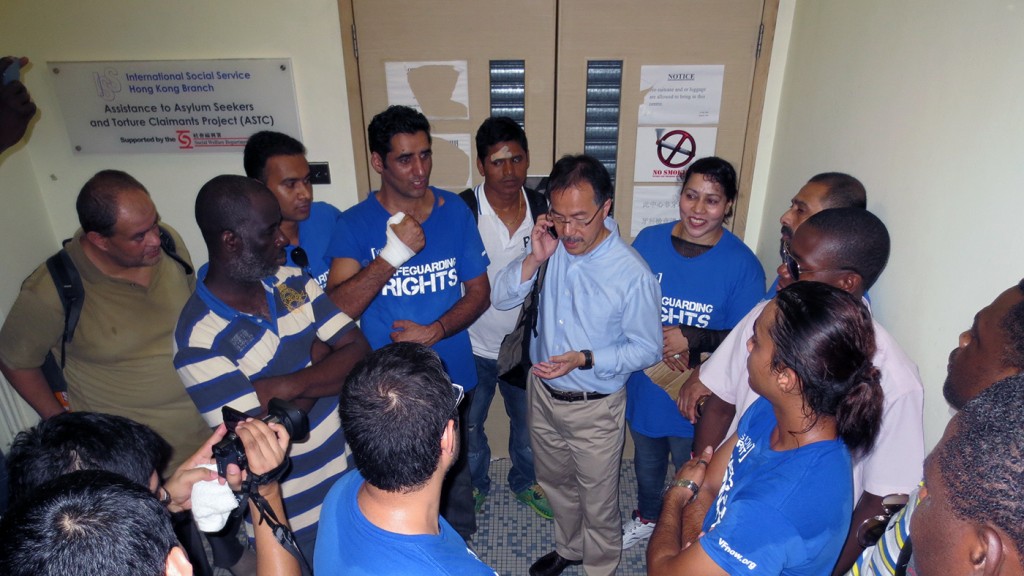
Ill-treatment of refugees tarnishes Hong Kong’s reputation
Feb 16th, 2015 | Advocacy | Comment
Prior to February 2015 a considerable number of homeless refugees were assigned single-occupancy rooms in guesthouses by ISS-HK when they failed to find rooms for the 1500$ rent assistance. Today the refugee community is reluctantly coming to terms with a hard to swallow shift in policy.
The practice was ironic and ill-conceived, as ISS-HK would spend 8000$ a month on hotels (in some cases for over a year), having frequently refused to increase the rent assistance by only a few hundred dollars. This resulted in an avoidable waste of public funds, as Vision First reported in several blogs, including “Homeless refugee forces ISS-HK to pay for guesthouse”, “A refugee clashes with the absurd at ISS-HK” and “Breaking the rent assistance barrier”.
Starting last week, refugees were unceremoniously locked out of guesthouses after ISS-HK payments were stopped. The decision is not unreasonable, as the guesthouse solution wasted millions of dollars that should have been more prudently allocated. Ibrahim from Togo requested a 400$ increase for his family of four, only to be turned down and lodged in a 13,500$ guesthouse room instead.
What next? The clampdown on guesthouses comes at a time when dozens of refugees are evicted from illegal refugee slums across the New Territories without adequate assistance. About a hundred refugees have found themselves in the streets. This amounts to a worrying housing crisis. Considering the prohibition from taking up employment and 15 months jail for working illegally, a perfect storm is heading towards increasingly homeless refugees. Does this reflect a hidden agenda?
Refugees say they are encouraged by caseworkers to share rooms and handed the mobile number of housing ‘fixers’. Last week five African refugees rented a two-room flat in To Kwa Wan for 7800$ which their combined rent assistance of 7500$ almost fully pays. Assuming they can share tight quarters for months, what will happen if one is deported or leaves Hong Kong? Policy dictates that security deposits are only paid once for as long as a refugee is in town.
The refugee community is divided. Many South Asians have for years bunked together and are already accustomed to living 4 to 6 in subdivided rooms where they sleep back to back, sometimes taking daytime and nighttime shifts. Housing ‘fixers’ enjoy a thriving business and an astute lady operating from Tsim Sha Tsui Mansion is said to lodge almost 200 refugees with payments from ISS-HK.
However the arrangement of packing 4 to 6 adults into rooms no larger than Ping-Pong tables should raise concerns. Aren’t these flats effectively unlicensed dormitories, where overcrowding presents more than a challenge to safety and fire regulations? How are hygiene and health standard managed when kitchens are turned into sleeping areas and toilets used for storage?
In a community where health risks pose daily concerns to the authorities, is it appropriate to pack refugees in such confined, inhumane spaces? What happens when one falls sick? Where do they store documents and personal belongings? Are refrigerators large enough for food rations? And why are potentially traumatized refugees forced to give up privacy as if in detention? Mental disorders and PTSD, often caused by persecution, are aggravated by ongoing stress and anxiety.
Further, the aggregate rent paid for such subdivided flats (one unit partitioned into five rooms) often exceeds 20,000$ which clearly is a huge incentive for fixers to expand market share while the slums close down and the number of asylum seekers in Hong Kong nears 10,000 for the first time in history.
Vision First urges the authorities to review the failed ‘humanitarian assistance’ for refugees as tightening the welfare screws to avoid ‘creating a magnet effect’ is evidently a failure. The number of refugees from the Global South seeking asylum in Hong Kong doubled in 2014. This is not a temporary ‘problem’ that can be fixed by ill-treatment that only tarnishes the reputation of our great city.
Lucky’s brother set to bring legal proceedings
Feb 12th, 2015 | Advocacy, Legal | Comment
“The civil war ended in 2009 but Tamil people are still dying. My second brother was kidnapped and disappeared in Sri Lanka. Yesterday I saw [Lucky’s] body in a morgue after he burned to death while in exile in Hong Kong. I hadn’t seen him since I fled to England 16 years ago,” said Sivaharan who arrived from London on Sunday as a British citizen to see his brother Lucky, who tragically died in a slum fire days ago.
The resemblance with his brother Lucky is striking. And yet their fates are irreversibly worlds apart: one is a holder of a United Kingdom Passport, the other of a Death Certificate courtesy of the Hong Kong Government that failed to protect Lucky and was unwilling to support him in a dignified manner. Such a regrettable treatment by the Hong Kong government sealed his tragic fate.
Sivaharan’s gentle smile hides a broken heart. He deleted Lucky’s photo from his mobile phone as they were too painful to see. Having to identify the charred remains of his beloved brother will only worsen his nightmares. “My mother hasn’t stopped crying,” he sighs, “She thought Lucky was safe here and cannot believe she has now lost two of three sons. How can Hong Kong treat victims of war like this?”
There is no point explaining to him that Hong Kong appears to have a well-established practice of delaying the assessment of asylum case, especially when allegedly strong, to avoid acknowledging them. That would be too crass a justification for anyone to understand, particularly the relative of a victim abandoned without adequate welfare assistance to years of living dangerously in a slum. The unfairness of such a process drags it deep and swiftly into the abyss of injustice.
Nothing can bring him back to life, but the government and rule of law that failed to protect Lucky might be redeemed by bringing to justice those who participated – directly and indirectly – in his horrific death. To this end, Lucky’s brother will bring civil proceedings against the landlord of the slum, International Social Services Hong Kong (ISS-HK) for approving and renting the tin hut, the Social Welfare Department (SWD) that failed to monitor its contracted agent ISS-HK, and the Lands Department that failed to purge known slums in a timely fashion.
A successful damage claim is virtually cast-iron as Lucky was a non-refoulement claimant whose safety and well-being was entrusted entirely with the intended Defendants being the Hong Kong Government and its agents. Regrettably the government and its agents settled Lucky in an illegal and inherently dangerous slum from September 2008 to January 2015, and thus the Defendants are all responsible for his tragic death.
“I visited other slums and I am shocked,” relates Sivaharan, “Electric wires dangle by the sink and shower. It is so scary. They look nicely decorated inside, but these are death traps. The huts are tin sheets offering little protection. I feel sorry for refugees who live in such misery for years. We don’t hear about it [HK treatment of refugees] in the UK. The lives of refugees should not be endangered by a government that ought to protect them.”
An order for specific discovery is likely to reveal the extent of negligence, malfeasance and nonfeasance of each Defendant. Let’s only hope that Lucky’s dead wasn’t in vain.
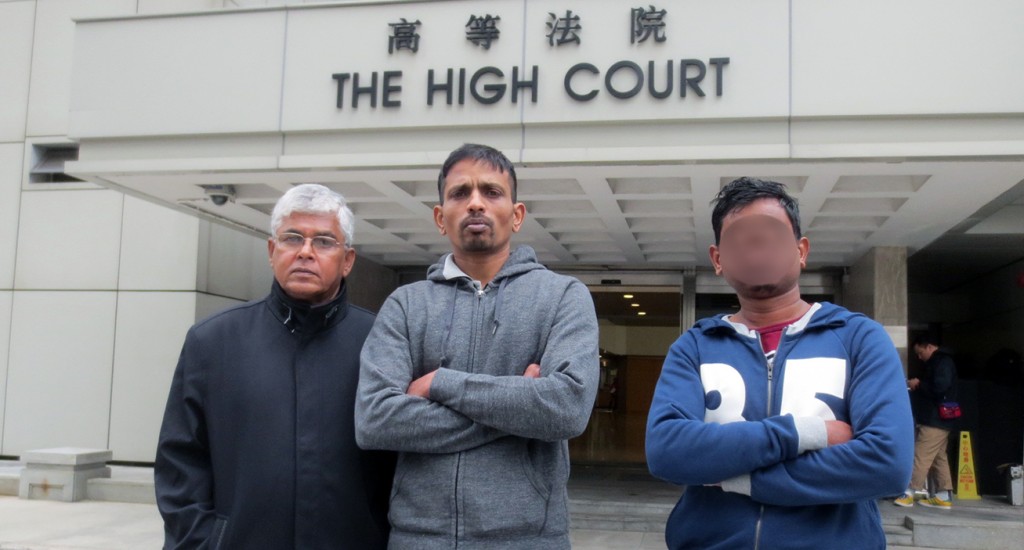
RU calls protest against deadly conditions in slums
Feb 4th, 2015 | Advocacy, Housing, Refugee Community, Welfare | Comment
Rooting advocacy in dignity and respect
Jan 1st, 2015 | Advocacy, Rejection, VF Opinion, VF updates, programs, events | Comment
Dear VF members and supporters –
A refugee blogger reminded us that people should be judged by the breadth of their mind and the depth of their character, not by their social position or economic achievement, and certainly not by their immigration status imposed by states.
One would think that this fundamental notion should be generally accepted as obvious in our day and age, but does it consistently discharge ingrained preconceptions, cultural bias and ethnic stereotypes?
There is a wide range of views about what constitutes respect, a mindset that perhaps has less to do with how people are esteemed, and more to do with how others are treated. The Golden Rule might be taken as an acceptable universal standard, for it is found remarkably at the root of many cultures.
The Golden Rule states that, “One should treat others as one would like others to treat oneself.”
This ethic of reciprocity prescribes a mutual, two-way relationship between oneself and others that involves genuine equality in treatment, particularly as a fair formula to resolve conflicts. Advocates will recognize that this concept underpins most international treaties and many domestic laws relating to the treatment of those perceived with otherness, different or foreign, refugees or not.
In 2014 Vision First continued to undergo a significant evolution in order to replace a comfortable program-centered approach with a challenging watchdog core. This transformation didn’t come easy, but was necessary to adapt our agency to an emerging reality in the asylum sphere, which Vision First were instrumental in generating, namely, the emergence of the refugee activist.
Critics might lament that we are too radical, that we are incapable of collaborating and prefer to provoke conflict, than foster dialogue. We contend that the strong opinions informing our actions are supported by even stronger data extracted from the reality we observe daily.
Therefore we believe that the keystone is the Golden Rule in its cautionary form: “One should not treat others in ways that one would not like to be treated.” As unlikely as it is that we will ever experience the hardship of asylum, truth is that governments are increasingly irresponsive to citizen wishes and needs, other than the most powerful. What if one day we were humbled into calling for help and those we pleaded with turn the other way?
What would we think if forced to seek asylum in a country where protection was an empty, illusory promise? Would we then be outraged at a zero-percent acceptance rate? How would we appraise insufficient welfare without the right to work? Would we submit to living in rat-infested slums as directed by government contractors? Would we keep quiet if our food rations were pilfered? What would we tell our children if we couldn’t buy school books?
How would we then esteem a society that fails indifferently to act upon our grievances?
These might be questions far too remote and abstract for wealthy readers who enjoy, or so they believe, freedom of speech and social security. Such answers might reverberate in the warmer corners of our heart, where the spirit of humanity overshines misguided conformism and complacency.
We might find consolation in charity by giving to malnourished children in evidently distant geographies, but turn a blind eye to families suffering in our community. Would we sleep comfortably at night knowing that our donations might indeed cause more harm than good in the long run?
Vision First champions advocating fearlessly against injustice by consistently speaking bluntly to counter unfair policies and reprehensible activities, even when threatened with defamation. We are less concerned about what will happen to us personally, than the discrimination suffered by our members.
Perhaps the effectiveness of an advocate is best measured by what she is prepared to sacrifice, outside her obvious comfort zone, because personal misery has a distinctive way of clarifying one’s convictions.
Hong Kong is a hard and forbidding metropolis for those unfortunate enough to hold undesirable citizenship, or have experienced grim circumstances. It has been said that the measure of civilization and its moral progress should not be judged by the treatment of its highest people, but of its lowest. In this respect, each citizen decides whether to defer to power and privilege, or defend the vulnerable.
Vision First firmly contends that it is scandalous to hold anyone in poverty, want and insecurity. Our present mandate is to safeguard refugee rights and, as such, we shall redouble our efforts to counter unjust policies and intolerable practices apparently formulated to control rather than assist refugees.
Vision First thrives in conflict, open debate and change and we look forward to generating more in 2015.
Happy New Year!
New Year Message in PDF format
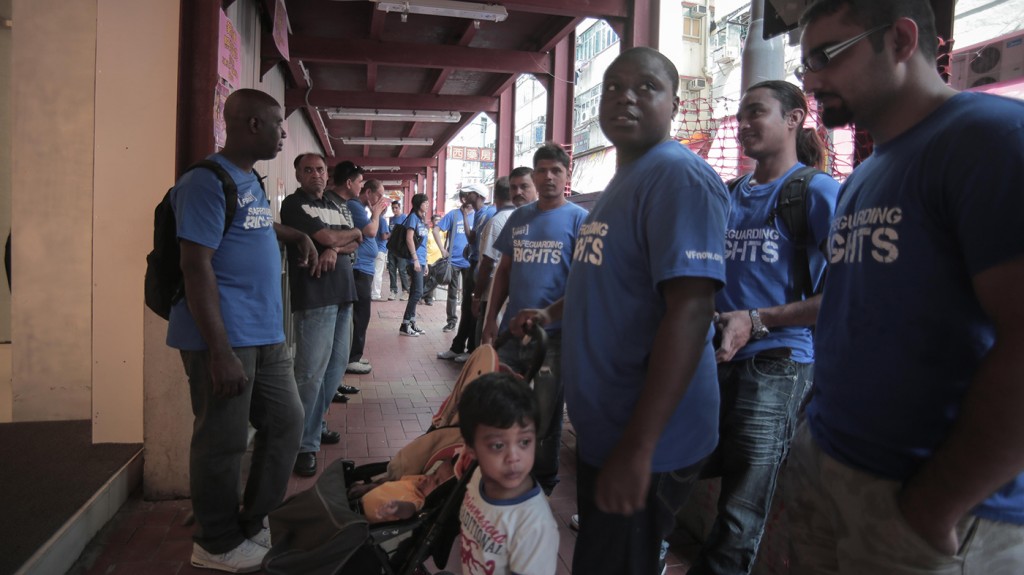
Who safeguards the inherent rights of refugee children?
Dec 29th, 2014 | Advocacy, VF Opinion | Comment
The op-ed by Grenville Cross SC recently published in the SCMP, “Hong Kong’s children need better protection of their rights” is worthy of our attention and comment. Vision First applauds the advocate for attempting to shed light on what constitute the best interest of children and how the government is on the right path to deliver better policies and reforms, albeit slowly.
However, Grenville Cross SC may not be aware of the appalling infringement of the rights of refugee children. Vision First therefore invite him to visit refugee families that are conspicuously sidestepped by the same administration he states is working towards eradicating poverty and enhancing the livelihood of the poor. He would then witness first-hand how children with refugee parentage are forced to endure the shameful conditions the government claims to be tackling.
The pattern is as disgraceful as it is widespread and Vision First repeats it emphatically: refugee parents are compelled to work illegally to pay living and education costs inexplicably only covered by the government in part; mothers worry their children will go hungry when meager food rations are consumed before the next three monthly collection; children dejectedly skip school when travelling allowances are exhausted; students are discriminate against because they cannot afford to buy school books, lunch-boxes, uniforms, or join extra-curriculum activities, or bring cake to birthday parties.
Nobody is under any illusion about the challenges and cost of raising children in our expensive city. Basic but necessary expenses disregarded by the government can only be met by refugee parents if they either humble themselves by begging, or stoically risk incarceration by engage in illegal work, both activities presenting predictable and unenviable drawbacks.
While charity is neither sufficient nor dependable in the long term (NGO workers cherry-pick the fortunate), work is outlawed as a serious crime punishable by a mandatory custodial sentence (maximum 36 month jail and 50,000$ fine). Since parents are stigmatized as unwelcome vagrants denied legal and economic rights, refugee children are often condemned to live without one at home if a parent is jailed for earning money for food, clothes, transport or school.
All this happening in dreadful, unsanitary living conditions, frequently in slums, and under unending psychological distress. In fact, refugee children are condemned to suffer 40 percent below the poverty line, without any prospects of improving prospects as parents are legally prevented from earning a living. And this without taking into account the statelessness they are generally condemned to when parents are fearful of their consulate authorities.
Vision First raises alarming questions about the vulnerability of refugee children:
- Why are refugee children ignored despite falling well below what is provided to the poorest resident children?
- Why do authorities fail to address the huge criticism in UN reports, including this one by the Committee on the Rights of the Child?
- Will the Child Protection Institute promote the rights and wellbeing of refugee children, who are the veritable invisible and untouchable in our society?
- When will HK government safeguard the inherent rights of these children?
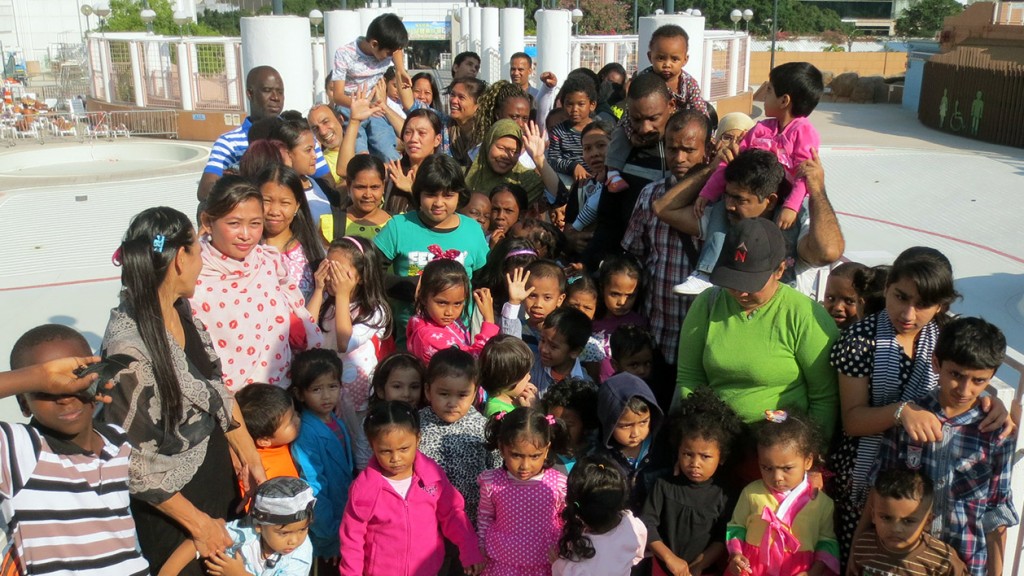
VF Report: The Slum in the Farmhouse closes down!
Dec 28th, 2014 | Advocacy, Housing, VF Report | Comment
Since 2010 Vision First visited regularly “The Slum in the Farmhouse”. Remember the purported landlady who boiled water on a fire for refugees to shower? On these visits we collected information and evidence from residents who at one point numbered 22 refugees, the overwhelming majority of whom were actively managed by ISS-HK through monthly “Agreements for provision of service” (including public rent paid with tax-dollars and home visits to approve allegedly unauthorized structures).
For two years Vision First steadfastly contended that it is wrong and immoral to subject refugees to degrading and dehumanizing living conditions. Such a contemptible practice is particularly scandalous since refugees are prohibited from working and thus cannot earn their way to better accommodation.
Vision First is pleased to report that finally something is changing!
ISS-HK seems to be reacting to the exposure of refugee slums. The Social Welfare Department contractor no longer approves certain slums as residence for refugees and advises tenants to look elsewhere for proper accommodation. Why? Is it an acknowledgement that something was improper?
While we can only speculate on ISS-HK’s decisions, we ponder why certain slums are going out of business. Do some slum lords feel pangs of guilt for exploiting refugees? Very unlikely. Is surgical enforcement action being taken by government departments to purge illegal structures only in a limited number of slums? Possibly. If information on these dreadful compounds is not readily available to these departments Vision First will ensure it will be.
Facts lead us to believe that cracks are appearing in the way refugees are segregated into slums. SWD helps us to form this opinion. In November 2014, the SWD announced a new tender dividing Hong Kong into three regions, introducing competition and launching food coupons to counter widespread irregularities in the food distribution channel.
Crucially, SWD replied to Vision First‘s questions on the tender by stressing that refugees need to be housed in legal structures. The closure of some slums (curiously not the worst structures) might indicate that Hong Kong government is no longer willing to tolerate irregularities in refugee welfare management that raised public queries and complaints.
A few months ago, refugees who lived in Slum No. 12, some for up to five years, started to report that their case workers at ISS-HK were unwilling to extend tenancy agreements in that compound. Tenants curiously admitted that “Mammy did not have the right documents” (as the slum lady was popularly called), confirming Vision First’s suspicions of irregularities.
Subsequently, expiring tenancy agreements at the Slum in the Farmhouse were not renewed and homeless refugees were not permitted to settle there. The number of ISS-HK clients in the compound steadily dwindled from almost twenty at the beginning of the year to just three in November 2014, evidence that the tide had turned.
This policy shift raises troubling questions. What will ISS-HK do with the refugees whose rooms are now been deemed improper? Does ISS-HK expect that these clients will relocated to other ‘acceptable’ slums? Isn’t this just shifting and confining vulnerable people from one dump to another?
When the last three leases will expire, the Slum in the Farmhouse will cease to exist and that is certainly a reason to celebrate. However, it seems that the plug was pulled because of reasons other than dangerous living conditions which might signify that SWD continues to support refugee slums.
VF’s original report on the Slum in the Farmhouse (4 Sep 2013)
